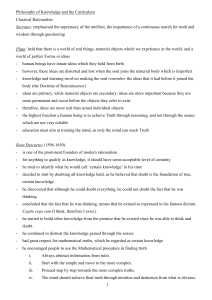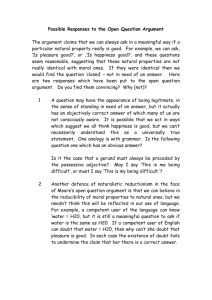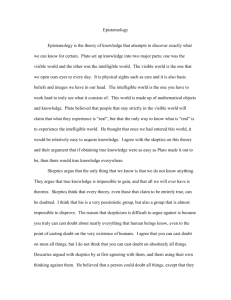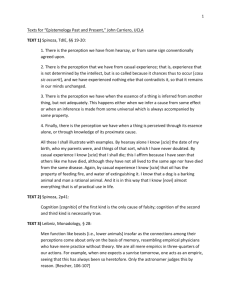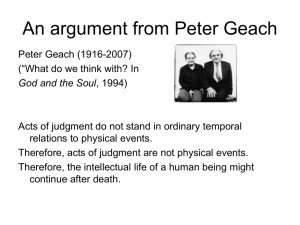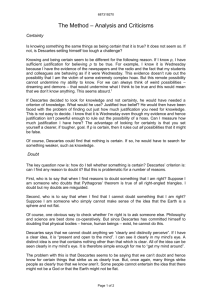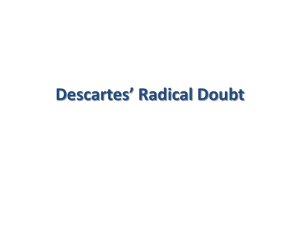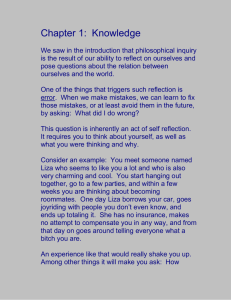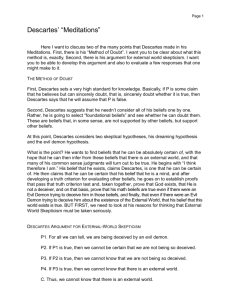Epistemology1FirstEs..
advertisement
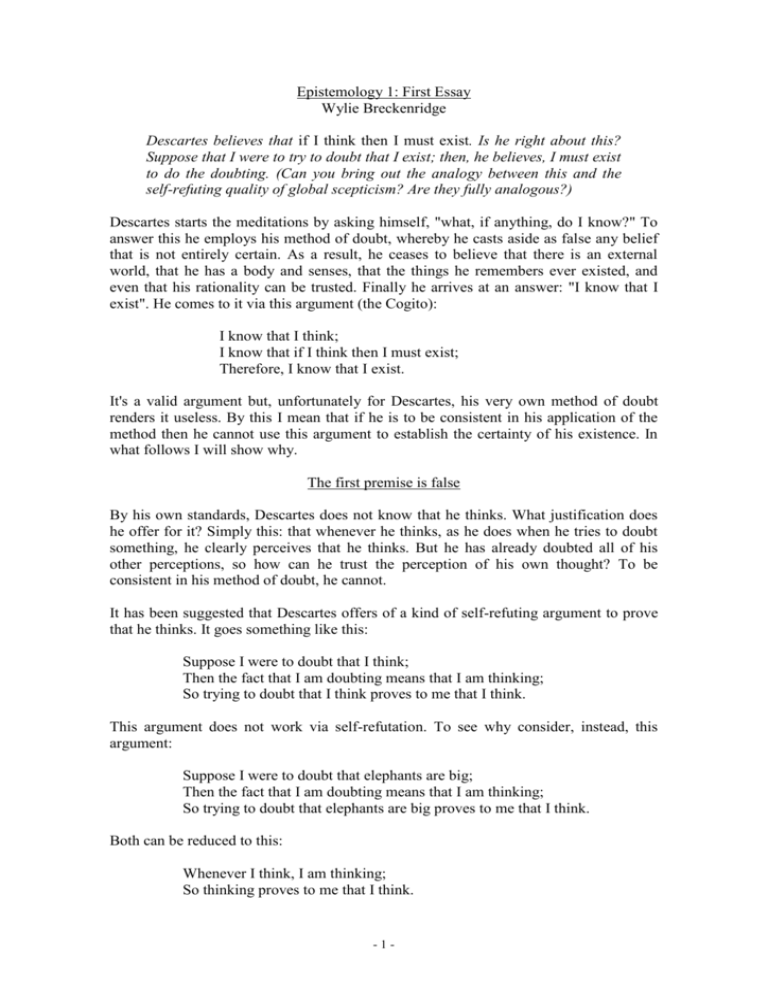
Epistemology 1: First Essay Wylie Breckenridge Descartes believes that if I think then I must exist. Is he right about this? Suppose that I were to try to doubt that I exist; then, he believes, I must exist to do the doubting. (Can you bring out the analogy between this and the self-refuting quality of global scepticism? Are they fully analogous?) Descartes starts the meditations by asking himself, "what, if anything, do I know?" To answer this he employs his method of doubt, whereby he casts aside as false any belief that is not entirely certain. As a result, he ceases to believe that there is an external world, that he has a body and senses, that the things he remembers ever existed, and even that his rationality can be trusted. Finally he arrives at an answer: "I know that I exist". He comes to it via this argument (the Cogito): I know that I think; I know that if I think then I must exist; Therefore, I know that I exist. It's a valid argument but, unfortunately for Descartes, his very own method of doubt renders it useless. By this I mean that if he is to be consistent in his application of the method then he cannot use this argument to establish the certainty of his existence. In what follows I will show why. The first premise is false By his own standards, Descartes does not know that he thinks. What justification does he offer for it? Simply this: that whenever he thinks, as he does when he tries to doubt something, he clearly perceives that he thinks. But he has already doubted all of his other perceptions, so how can he trust the perception of his own thought? To be consistent in his method of doubt, he cannot. It has been suggested that Descartes offers of a kind of self-refuting argument to prove that he thinks. It goes something like this: Suppose I were to doubt that I think; Then the fact that I am doubting means that I am thinking; So trying to doubt that I think proves to me that I think. This argument does not work via self-refutation. To see why consider, instead, this argument: Suppose I were to doubt that elephants are big; Then the fact that I am doubting means that I am thinking; So trying to doubt that elephants are big proves to me that I think. Both can be reduced to this: Whenever I think, I am thinking; So thinking proves to me that I think. -1- This clearly has no flavour of self-refutation. In fact, it only works on the assumption that when I think, I know that I think. That this is true, says Descartes, is just something we perceive. It might be objected that I have not adequately presented Descartes' argument here. To answer this, I'll present it in two more ways and show that neither is a valid self-refuting argument. The first is this: 1. 2. 3. 4. 5. Suppose I doubt that I think. Then because I doubt something, I think. Thus I would know that I think. But this contradicts my original assumption. So I cannot doubt that I think. The error here is in line 3. If I doubt that I think then I must be thinking to do the doubting, but it does not follow that I would know that I am thinking. We can see that the argument is fallacious by considering what it purports to prove - that doubting that I think leads to a contradiction. But that is not true. I can doubt that I think, just as well as I can doubt that I have no body. What I cannot do is doubt that I think, while at the same time think that I think. A second argument removes this flaw: 1. 2. 2.5. 3. 4. 5. Suppose I doubt that I think. Then because I doubt something, I think. Whenever I think, I know that I am thinking. Thus I know that I think. But this contradicts my original assumption. So I cannot doubt that I think. This, now, is a valid argument. But the truth of the conclusion relies on the truth of the new line, 2.5. This, however, takes us back to Descartes' original claim - that my thinking is clear to me whenever I think. That the first premise is false is enough to cast doubt on Descartes' conclusion - that he knows that he thinks. There are, however, more problems… The second premise is false I will show below that the proposition "if I think then I must exist" is as dubitable as the proposition "if a chair is red then it must be red". Leading up to the Cogito Descartes decided that the latter could be doubted, and so, if he is to be consistent, he must also doubt the former. Thus Descartes' second premise, that he knows that "if I think then I must exist" is rendered false by his own standards. -2- Why do I say that "if I think then I must exist" and "if a chair is red then it must be red" are equally dubitable? Because they are justified in the same way. In the next few paragraphs I'll show why this is the case. Firstly, when Descartes says, "I exist", he means it in the broadest possible sense - that I exist simply if I am not nothing - if I am at least something. For me to exist he doesn't require that I be a physical object, or that I have any special attributes. Indeed, these are the very things that he doubts. He just requires that I be something. To keep this clear, I will write the first claim as "if I think then I must be something." Consider, now, the claim that "if a chair is red then it must be red". The justification for this is that if I try to conceive of a chair that is red and also not red, then I have to simultaneously conceive that so-and-so is the case and that so-and-so is not the case (where so-and-so is 'the chair is red'). From this it is concluded, either rightly or wrongly, that if a chair is red then it must be red. The first claim can be justified in the same way. To make this clear, consider the following. Suppose I try to conceive of something that is nothing; that has no existence of any kind, not even as an idea. It's not too hard to do - I can just imagine the room I'm sitting in right now, but without the chair in the corner and me without any memory or idea of the chair. I have to conceive of a world in which the chair has no properties whatsoever and has never existed as an idea in anyone's mind. As soon as I attribute any property to the chair, then I'm conceiving it to be something. If I conceive it as blue, then I'm conceiving it to be at least a patch of blueness. If I conceive that someone imagines it, then I'm conceiving it to be at least an idea in that person's mind. If I conceive it to think, then I'm conceiving it to be at least a thinking thing. This is what is important here: If I conceive that a thing thinks then I'm conceiving it to be something. In particular, I can take that thing to be me, so that if I conceive that I think then I'm conceiving that I must be something. Now consider the claim "if I think then I must be something". Suppose I try to conceive that I think and also that I am nothing. Then, as demonstrated in the previous paragraph, when I conceive that I think I also conceive that I am something. So I have to conceive both that I am something and that I am nothing. That is, I have to conceive that so-andso is the case, and that so-and-so is not the case (where so-and-so is 'I am something'). But this is the same situation that I found myself in with the first claim. Thus, just as I did there, I can conclude that "if I think then I must be something". So the two claims - that "if I think then I must be something" and "if a chair is red then it must be red" - must stand or fall together. If I doubt one, then I am logically obliged to doubt the other. That's why I say they are equally dubitable. Descartes cannot trust his argument So far I have shown that although Descartes' argument for his existence is valid his two premises are both false, and so he can claim nothing about the truth of the conclusion. But even if the premises were true, Descartes would still have to doubt the truth of the conclusion. The reason is that leading up to the Cogito Descartes placed in doubt all of his logical principles. To be consistent, then, he cannot use any logical argument to establish something indubitable. -3- What Descartes could have done So the Cogito does not establish for Descartes the certainty of his own existence, and thus he does not have his hoped-for foundation upon which to build knowledge. Perhaps he could have established his existence in another way, and perhaps it was an impossible task. In either case, I think that by adopting a different approach he could have successfully provided a sure foundation. Consider the question that Descartes asks himself - "what do I know". It involves a hidden assumption - that there is an "I" that can "know". If there wasn't, then the question would not make sense. So if I doubt my existence or that I think, then I doubt the meaningfulness of the very question I am trying to answer. Furthermore, if I didn't exist or didn't think, then there would be no "I" or no "knowledge" and thus no need to secure my knowledge by engaging in systematic doubt. So Descartes could have proceeded, instead, by asking himself: "assuming that I exist and that I think, what more do I know?" His answer would then have been, "nothing". But his assumption would provide the foundation that he wanted, and it would be secure. -4-

